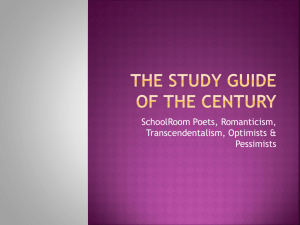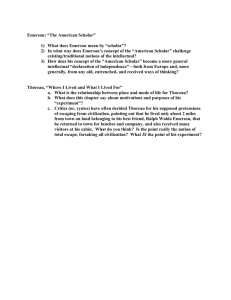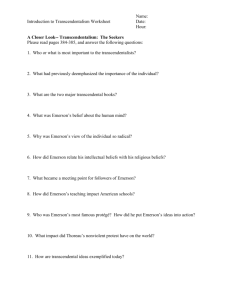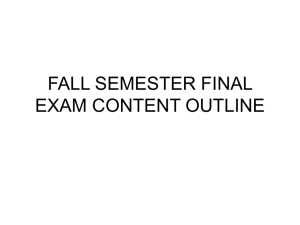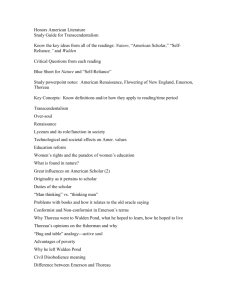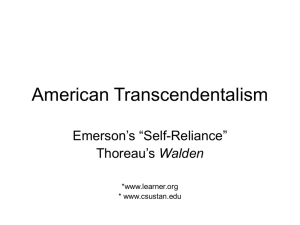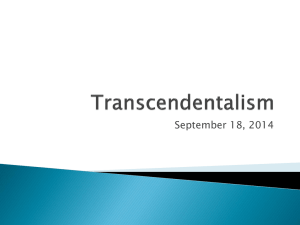Intro to Transcendentalism
advertisement
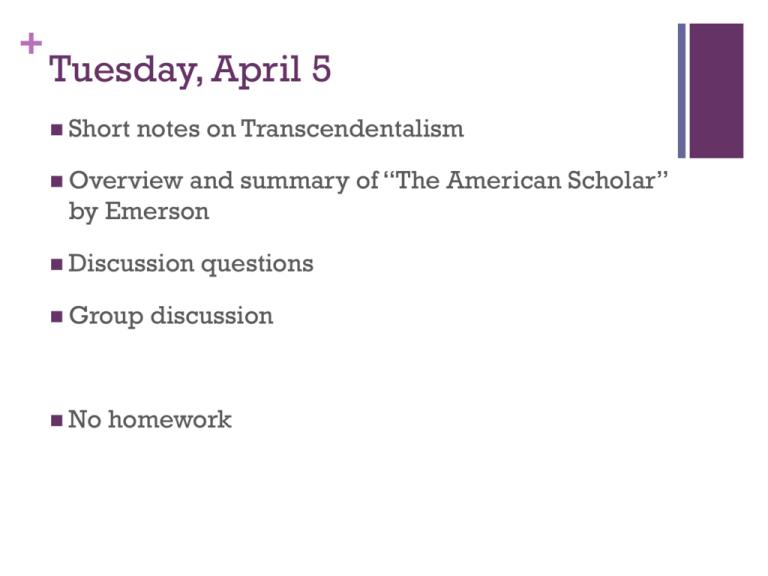
+ Tuesday, April 5 Short notes on Transcendentalism Overview and summary of “The American Scholar” by Emerson Discussion Group No questions discussion homework + Romanticism Transcendentalism Transcendental movement may be described as a slightly later, American outgrowth of romanticism. Rooted in Kant’s belief that “all knowledge is transcendental which is concerned not with objects but with our mode of knowing objects” Romanticism feeling, individual perception German idealism and optimism Hindu thought + Emerson’s Definition Ralph Waldo Emerson, Nature (1836) "Standing on the bare ground,--my head bathed by the blithe air, and uplifted into infinite space,--all mean egotism vanishes. I become a transparent eye-ball. I am nothing. I see all. The currents of the Universal Being circulate through me; I am part or parcel of God" (996). + Transcendentalism – 1835ish to 1850ish Belief in an ideal spiritually that “transcends” the physical and is realized through the individual’s intuition. Search for truth. + Transcendental Club The club was a meeting-place for these young thinkers and an organizing ground for their idealist frustration with the general state of American culture and society at the time. Transcendentalism's “Flowers” Utopianism Socialism Women’s rights “free love” Abolitionism Environmentalism + Henry David Thoreau 1817-1862 Walden, a reflection upon simple living in natural surroundings Civil Disobedience, an argument for individual resistance to civil government "I ask for, not at once no government, but at once a better government” “That government is best which governs not at all;' and when men are prepared for it, that will be the kind of government which they will have." + Ralph Waldo Emerson 1803-1882 Champion of individualism. Emerson wrote on a number of subjects, developing certain ideas such as individuality, freedom, the ability for man to realize almost anything, and the relationship between the soul and the surrounding world. Philosophy of Transcendentalism discussed in his 1836 essay, Nature. A year later, on August 31, 1837, Emerson delivered his now-famous Phi Beta Kappa address, "The American Scholar”. + + “The American Scholar” At the time, women were barred from higher education, and scholarship was reserved exclusively for men. America's "Intellectual Declaration of Independence”. Emerson urged Americans to create a writing style all their own and free from Europe. A student at Harvard called it, "an event without former parallel”. Another member of the audience, Reverend John Pierce, called it "an apparently incoherent and unintelligible address”. “The American Scholar” 1837 + The text begins with an introduction (paragraphs 1-6) in which Emerson explains that his intent is to explore the scholar as one function of the whole human being: The scholar is "Man Thinking." The remainder of the essay is organized into four sections: The influence of nature (paragraphs 7 and 8) The influence of the past and books (paragraphs 9 -18) The influence of action on the education of the thinking man (paragraphs 19-27) In the last section (paragraphs 28-41), Emerson considers the duties of the scholar and then discusses his views of America in his own time. + Number the paragraphs of the essay 1 Page 1 -1 to 6 Page 2 – 6 to 11 Page 3 – 11 to 16 Page 4 – 16 to 21 Page 5 – 21 to 27 Page 6 – 27 to 29 Page 7 – 30 to 33 Page 8 – 33 to 99 Page 9 – 40 and 41 41 + Discussion Activity 1. I will assign you an example of Transcendentalism to focus on (from the chart handout). Find quotes and examples and provide explanations. 2. After you have finished step 1, answer the questions on the handout. 3. Cite examples using page and paragraph # 4. Turn in one handout per group (make sure all group member names are on it). Please get into groups of 3 – 4. + Discussion of “The American Scholar” You will lead the discussion for your group’s assigned questions. Everyone should participate in the discussion, even if it’s not your group’s assigned question.
